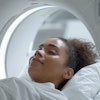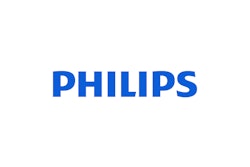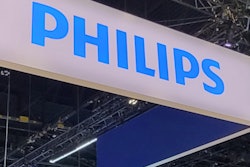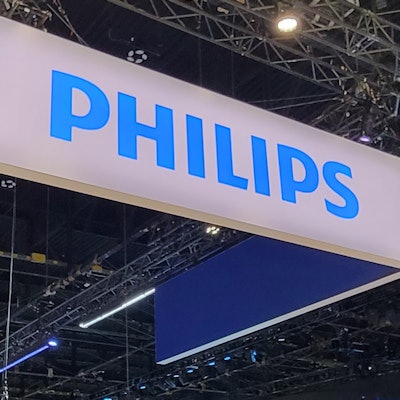
Two new MRI scanners at 3-tesla and 1.5-tesla field strengths are among the new product launches at RSNA 2021 for Philips. The company is also demonstrating a midrange CT scanner and a new interventional suite that combines CT with angiography.
MRI
MR 5300 is a 1.5-tesla scanner that extends to a new scanner the BlueSeal helium-free operation concept Philips first pioneered in 2018 on its Ingenia Ambition X scanner. The technology seals helium directly into the magnet, such that BlueSeal scanners do not require helium refills or quench pipes.
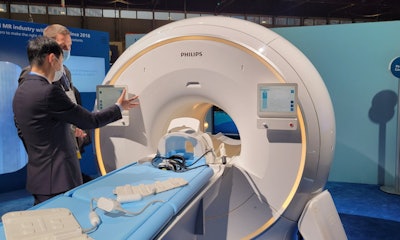 The Philips MR 5300 1.5-tesla scanner.
The Philips MR 5300 1.5-tesla scanner.MR 5300 also features a number of enhancements powered by artificial intelligence (AI) to improve workflow, efficiency, and image quality, such as by simplifying and automating many complex clinical and operational tasks, according to the company.
The scanner features a 55-cm field of view and also supports Philips' dStream Breeze radiofrequency coils, which are designed to be lightweight and easily positioned on the patient; they can even be wrapped around patient anatomy. MR 5300 has received 510(k) clearance from the U.S. Food and Drug Administration (FDA).
The 3-tesla scanner is MR 7700, a magnet that's designed to be suitable for both clinical and research purposes. In designing the scanner, Philips started with its existing 3-tesla MRI platform and boosted the gradient strength to 65 mT/m, with a peak slew rate of 220 T/m/s.
Philips is highlighting MR 7700's integrated multinuclear clinical capabilities, which enable it to cover five additional nuclei. This gives researchers insight into more metabolic and functional information across anatomies, while also making multinuclei imaging possible as part of daily MR clinical workflow. FDA clearance for MR 7700 is pending; the system will begin shipping in the second quarter of 2022.
But it's not all big iron for Philips at RSNA 2021. In the realm of software, the company is discussing SmartSpeed, a new AI-powered data reconstruction platform. The platform applies the company's Adaptive-CS-Net AI algorithm directly to the source of MRI signals, and it is designed to support 97% of current clinical protocols. In fact, Philips will roll out SmartSpeed on its Compressed SENSE MRI acceleration technology to provide faster scanning with better image quality.
In other news, MR Workspace is a new AI-driven user interface that's designed to help users manage patients, prepare protocols, and in general plan for their workday, according to the company. MR Workspace is commercially available; it will be shipped on all new scanners and made available to the company's installed base in the field.
CT
In CT, Philips is highlighting the new CT 5100 Incisive scanner, new CT workflow software, and a new interventional suite that combines CT with angiography.
CT 5100 Incisive is the newest generation of the company's mid-range Incisive platform. For more efficient operation, the scanner is built around the company's CT Smart Workflow technology, which is designed to help technologists with tasks such as setting up exams.
The scanner includes a camera mounted in the ceiling that acquires images of patients; artificial intelligence (AI)-powered software then analyzes the patient and can help select scanning protocols and choose patient positioning. CT Smart Workflow is pending 510(k) clearance.
Also being shown for CT 5100 Incisive are tools for interventional radiology, such as illuminating the path for guiding needles to therapeutic targets.
The company is also emphasizing Spectral CT 7500, its flagship CT scanner that's been optimized for routine spectral imaging. The scanner was launched in May 2021.
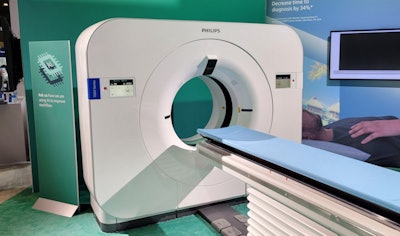 Philips Spectral CT 7500 scanner.
Philips Spectral CT 7500 scanner.Spectral CT 7500 acquires 8 cm of data per gantry rotation, compared with 4 cm on the company's previous IQon scanner. This eliminates the need to stitch images together and enables the new system to cover organs more comprehensively.
The scanner has an enhanced detector and imaging chain that allows single-pass image acquisition at 100 kVp, which is an optimal feature for scanning children and smaller patients. Philips scanners used to perform spectral scanning at 120 kVp.
Spectral CT 7500 is shipping commercially, and users are reporting that the scanner can cut the time to diagnosis by up to one-third, according to Philips.
Finally, the company is showing its Philips AngioCT interventional suite, which places a Spectral CT 7500 scanner on rails within an interventional suite outfitted with the company's FlexArm angiography system. Philips is working on the technology with Miami Cardiac & Vascular Institute of Miami and Mayo Clinic of Rochester, MN.
AngioCT is designed to give interventional radiologists easy access to both CT and angiography imaging in the same room, with either system able to be parked to the side when not being used. The configuration also supports diagnosis and treatment in the same room, according to the company. Philips sees interventional oncology as a promising area for the system, such as guiding the embolization of tumors, a task for which the CT scanner's spectral ability should prove useful.
The room runs on the company's Azurion interventional software, making it familiar to users of that technology.
Ultrasound
In ultrasound, Philips is highlighting new liver fat quantification tools available on the newest release of the company's Epiq Elite and Affiniti scanners. The tools are intended to improve ultrasound's ability to diagnose early-stage liver disease, and recently received FDA clearance.
Philips notes that nonalcoholic fatty liver disease (NAFLD) may be present in 25% of individuals around the world, and risk is elevated by factors including type 2 diabetes and obesity. NAFLD can include both milder fatty liver disease, as well as the more severe nonalcoholic steatohepatitis (NASH) and fibrosis. Early diagnosis can help clinicians and patients take steps to correct the condition before it worsens.
The tools are included in the company's release 9.0 software for the Epiq Elite and Affiniti scanners, and they support both the PureWave C5-1 and the small footprint mC7-2 MicroConvex transducer to accommodate different body types, the company said. Customers can also securely access on-demand, real-time guidance and decision support through the company's Collaboration Live technology.




